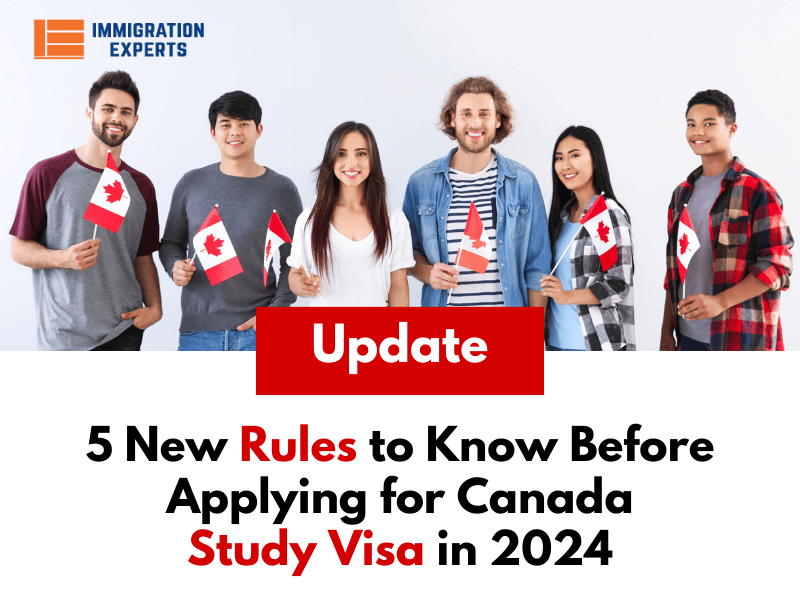051 8439995, 042 35911332

Are you about to start studying in Canada as an international student? While exciting opportunities await you, it’s important to be aware of certain important guidelines and regulations.
The regulations for international students in Canada aim to ensure a positive and smooth experience, rather than limiting your opportunities.
Instead, these rules are designed to enhance your study and cultural journey, ensuring your success during your time in Canada.
Curious to know about the recent or upcoming changes introduced by the Canadian government for international students in 2024? If yes, let’s explore them together.
5 Updated Regulations for International Students in Canada (2024)
1. Increased Cost of Living
Starting from January 1, 2024, a new cost of living requirement of $20,635 has been implemented for applicants seeking Canada study permits. This amount is in addition to the initial year’s tuition and travel expenses. Additionally, the number of accompanying family members affects the required living expenses.

In the past, the living expense requirement was set at $10,000 in the early 2000s and remained unchanged, causing challenges for international students in meeting their basic needs.
Canada Study Permit Funds Requirement (Effective January 1, 2024)
The following table outlines the required amount of funds per year (excluding tuition) based on the number of family members, including the applicant:
- 1 person: CAN$20,635
- 2 people: CAN$25,690
- 3 people: CAN$31,583
- 4 people: CAN$38,346
- 5 people: CAN$43,492
- 6 people: CAN$49,051
- 7 people: CAN$54,611
For families with more than seven members, an additional CAN$ 5,559 is required for each extra family member. These financial requirements aim to ensure that international students and their families have the necessary funds to cover living expenses while studying in Canada.
2. Limit on the Number of International Students Entering Canada
It’s crucial to be aware that Canada has implemented a restriction on the issuance of visas for international students, resulting in a reduction of approximately 35% in the number of permits available.
In 2024, Canada has set a maximum limit of 606,250, intending to approve only 360,000 new study permits for the year. Before applying for a permit, it’s essential to understand and consider this cap on the number of international students in Canada.
Exemption: It’s important to note that the cap does not apply to:
- New study permit applications or extensions submitted from within Canada.
- Study permit applications for primary or secondary school levels.
- Study permit applications for graduate degree programs at the master’s or doctorate level.
3. Requirement for Provincial Attestation Letter (PAL) for Study Permits
For most new study permit applications submitted after 8:30 a.m. EST (Toronto time) on January 22, 2024, it is mandatory to include a Provincial Attestation Letter (PAL) from the province or territory where the applicant intends to study.
It’s important to note that the process for issuing PAL at the provincial or territorial level is still under development. The federal government anticipates that the PAL process will be operational by March 31, 2024.
Exemption: The PAL requirement for new study permit applications does not apply if you are applying:
- To enroll in a preschool, elementary school, or high school (up to grade 12).
- For enrollment in a master’s or doctoral degree program.
- For a study permit extension from within Canada.
4. Changes to Eligibility for Spousal Open Work Permits

In the upcoming weeks, open work permits will be exclusively available to spouses of international students pursuing master’s and doctorate degrees. Unfortunately, spouses of international students enrolled in other levels of study, such as undergraduate and college programs, will no longer qualify for these permits.
Who is eligible for an open work permit?
Open work permits are limited to the spouses and common-law partners of students enrolled in graduate (master’s and doctorate) and professional degree-granting programs only. After these changes take effect, spouses and common-law partners of international students looking to extend their existing work permits will still be eligible under this category.
Who is not eligible for an open work permit?
Spouses and common-law partners of international students in other levels of study, including undergraduate and college programs, will no longer be eligible for an open work permit unless they already possess one under this specific category.
5. Modifications to Post-Graduation Work Permit (PGWP) Eligibility
Commencing February 15, 2024, individuals who complete a master’s degree program in less than two years and fulfill all other PGWP eligibility conditions will now be entitled to a more extended three-year post-graduation work permit.
The duration of PGWPs for programs other than master’s degrees will continue to align with the length of the study program, with a maximum limit of three years.
Who qualifies for an extended post-graduate work permit (PGWP)?
Graduates of at least two-year programs in PGWP-qualified, approved learning institutions, along with graduates of master’s degree programs lasting less than two years, are eligible for a three-year PGWP.
Moreover, starting from September 1, 2024, international students embarking on a study program as part of a curriculum licensing arrangement will no longer be eligible for a post-graduate employment permit upon graduation.
PGWP Eligibility After Graduating From a Public-Private Partnership College Program
Current international students enrolled in this type of program will remain eligible for a PGWP if they meet other program eligibility criteria.
PGWP Ineligibility After Graduating From a Public-Private Partnership College Program
New students entering this program type will not be eligible for a post-graduation work permit.
